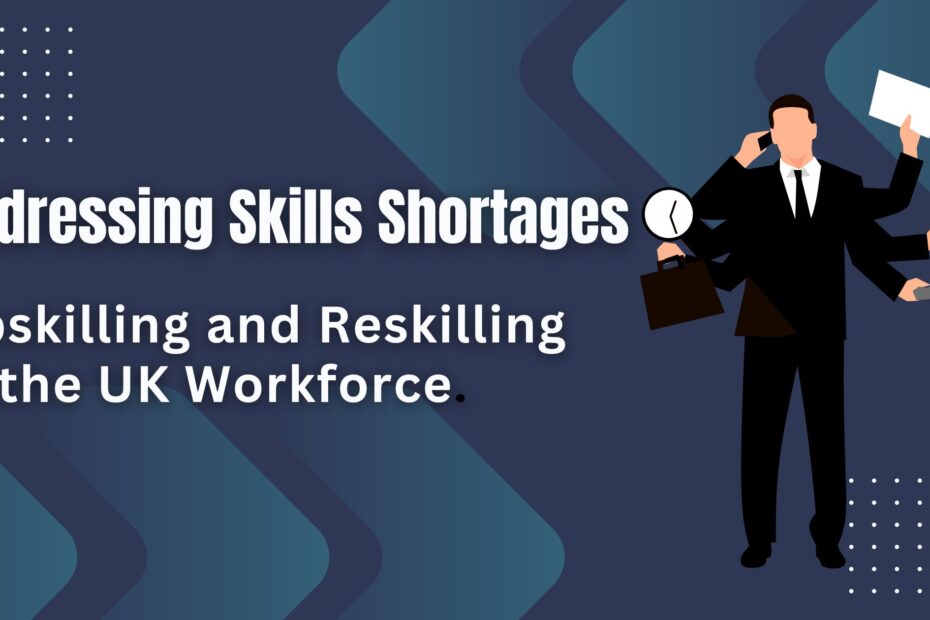
The United Kingdom, like many other countries, faces a pressing workforce challenge: skills shortages, which impede economic growth and development. The United Kingdom has prioritised upskilling and reskilling initiatives to address this issue. These initiatives aim to equip workers with the skills necessary to adapt to changing job demands, bridge skill gaps, and ensure long-term employability. The importance of upskilling and reskilling in addressing skills shortages in the UK workforce is dealt with in this article.
Understanding the Skills Shortages
When there is a mismatch between the skills required by employers and the skills possessed by the available workforce, there is a lack of skills. As a result, job openings may remain vacant, hampering productivity and innovation across industries. Technological advancements, changing market demands, and demographic shifts all play a role in these shortages. Significant skill gaps exist in industries such as technology, healthcare, engineering, and manufacturing in the United Kingdom.
Upskilling
Upskilling entails improving existing skills to meet the demands of new roles or advancements in a given field. It is a proactive approach that enables employees to remain relevant in a rapidly changing job market. A manufacturing worker, for example, might go through upskilling to learn how to operate advanced automation systems.
Collaborations between government agencies, educational institutions, and private enterprises are part of UK upskilling initiatives. Some strategies used to encourage upskilling include government funding for upskilling programmes, employee training subsidies, and tax breaks for employers investing in workforce development.
Reskilling
Reskilling takes a broader approach, requiring the acquisition of entirely new skills to transition into a different role or industry. It’s essential when certain job roles become obsolete due to automation or changes in market demand. For instance, a coal miner might need to learn new skills to work in the renewable energy sector.
The United Kingdom’s reskilling efforts concentrate on providing accessible training pathways for individuals looking to change careers. Flexible learning options, online courses, and vocational training centres are critical to assisting workers.
Strategies for Implementing Upskilling and Reskilling
Collaboration between Business
Educational Institutions, and Training Providers: Collaboration between businesses, educational institutions, and training providers is crucial to guarantee that the skills taught are consistent with market demands. These partnerships can assist in creating training programmes that are current and relevant.
Government Support and Policy
By offering incentives, grants, and subsidies to both employers and employees, governments can play a significant role in initiatives to upskill and reskill workers. Policymakers can create frameworks for encouraging continuous learning.
Flexible Learning Solutions
Employing flexible learning options like online courses, part-time study, and micro-credentials allows people to continue their education while still working. It is particularly important for those who may struggle to take time off for full-time education.
Lifelong Learning Mindset
It is essential to promote a culture of lifelong learning. People must understand that continuing education is necessary to stay competitive in a job market where skills are quickly turning obsolete.
Skills Assessment and Gap Analysis
Regularly assessing the skills of the current workforce and identifying skills gaps can help organisations tailor their upskilling and reskilling efforts to specific needs.
Customised Training Programs
By designing training programmes that are specific to the requirements of the workforce and the organisation, it is possible to develop skills that are directly related to the job roles.
Recognising Prior Learning
Recognising and accrediting prior learning and experience can expedite the upskilling and reskilling process, making it more attractive for individuals to engage in these initiatives.
Support for Career Transitions
People who are changing careers through reskilling may need support in the form of career counselling, help finding a job, and mentorship.
Measuring Impact
It is crucial to gauge how well upskilling and reskilling initiatives are working. Organisations can measure their success by keeping track of metrics like improved job performance, higher employee retention, and smooth career transitions.
Upskilling and reskilling individuals and businesses benefits everyone involved and increases economic growth and competitiveness. By providing workers with the ability to adjust to shifting skill requirements, the UK workforce can continue to be adaptable, creative, and prepared to meet the needs of employers in the future.
